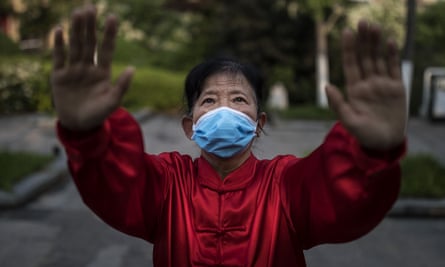Cases rise in Shulan, near the Russian border, and in Wuhan, where stringent lockdown measures had been eased in recent weeks.
An untraced coronavirus outbreak in a Chinese city near the Russian border and a spate of new cases in Wuhan has prompted fears of a fresh wave of infections in China.
On Sunday, Chinese authorities reclassified Shulan, a city near the Russian and North Korean borders, as high risk, after a cluster of cases connected to a woman with no known history of travel or exposure to the virus.
It came just a week after China designated all regions in the country as low or medium risk. On Sunday the country’s national health commission reported 17 new cases, its second day of a double-digit rise and its highest number in nearly two weeks.

–
Five locally transmitted cases were in three provinces which border Russia or North Korea – three in Jilin, and one each in Heilongjiang and Liaoning.
All of Jilin’s new cases were in Shulan city, including a 28-year-old woman, a 45-year-old man and a 56-year-old man, bringing the city’s total to 12.
Chinese state media, CGTN, said authorities have ordered the temporary closure of all public places in Shulan, including sports facilities, cinemas and libraries, and for all residents to stay home except under “unusual circumstances”. Students in their final year of middle or senior high school will return to online learning, it said. No taxis can leave the city, and all public transport has been suspended.
Local media said the source of Shulan’s chain of infection remained a mystery. Jilin provincial health commission said it originated with a 45-year-old woman who has no residential or travel history outside the province, and no known contact history with people returning from overseas or key provinces.
In recent weeks China has enacted border closures and social restrictions on areas bordering Russia, including Suifenhe, in the east of Heilongjiang province, after some people returning to China via land borders were diagnosed with Covid-19.
According to a local government WeChat account, on 2 May Shulan health authorities said that in the last three weeks of April, 308 Shulan residents had returned from Russia via Suifenhe and Manzhouli ports. Eight were quarantined in a Jilin infectious disease hospital, and the remaining 300 were isolated in Shulan city, the People’s Daily reported.
In the city of Wuhan, where the virus originated at the end of last year, Chinese authorities also reported five new cases on Sunday, the city’s highest number of new infections since 11 March.
The new cases, all local transmissions, were among 17 new cases nationwide, the highest in almost two weeks.
Authorities in Wuhan imposed draconian restrictions on travel and movement in what appeared to have been a successful bid to quash the outbreak.
That lockdown began to ease in recent weeks, as authorities said the disease was under control, most recently with children returning to school, and travel to and from the city allowed.
On Chinese social media the quick rise in cases sparked concern. “We still need to take protective measures, five cases is really terrible,” wrote one user on Weibo.
“Before [now] there were almost no transfers from asymptomatic to confirmed diagnosis in Hubei province,” wrote another. “Government should respond to social concerns in a timely manner.”
“It’s not easy to slow down,” wrote a third. “I felt a little relaxed and now it starts again, and I’m starting to panic again. Come on, Wuhan.”
China has reported a total of 82,918 cases and a death toll of 4,633.
Additional reporting by Lillian Yang
–
(For the source of this, and other equally scary, but important articles, please visit: https://www.theguardian.com/world/2020/may/11/now-it-starts-again-new-coronavirus-outbreaks-spark-unease-in-china/)









